Analyzing Volkswagen's Emission Scandal: Governance and Operations
VerifiedAdded on 2023/06/11
|13
|3435
|112
Case Study
AI Summary
This case study analyzes the Volkswagen emission scandal that erupted in September 2015, focusing on its impact on corporate governance and international operations. The scandal, triggered by the discovery of defeat devices in approximately 600,000 vehicles in the United States, led to significant financial losses, reputational damage, and a toxic corporate culture. Key figures like CEO Martin Winterkorn resigned, and the company faced numerous lawsuits and settlements, with estimated costs reaching $34.5 billion. The study identifies factors contributing to the scandal, including a demanding leadership style, lack of transparency, and inadequate corporate governance structures. It also explores the environmental and health impacts of the emissions. The company responded by overhauling its internal systems, modifying affected vehicles, and compensating customers. The study concludes with recommendations for preventing future scandals, emphasizing the importance of strong corporate governance, ethical leadership, and transparency. Desklib offers more resources like this, including past papers and solved assignments, to aid students in their studies.
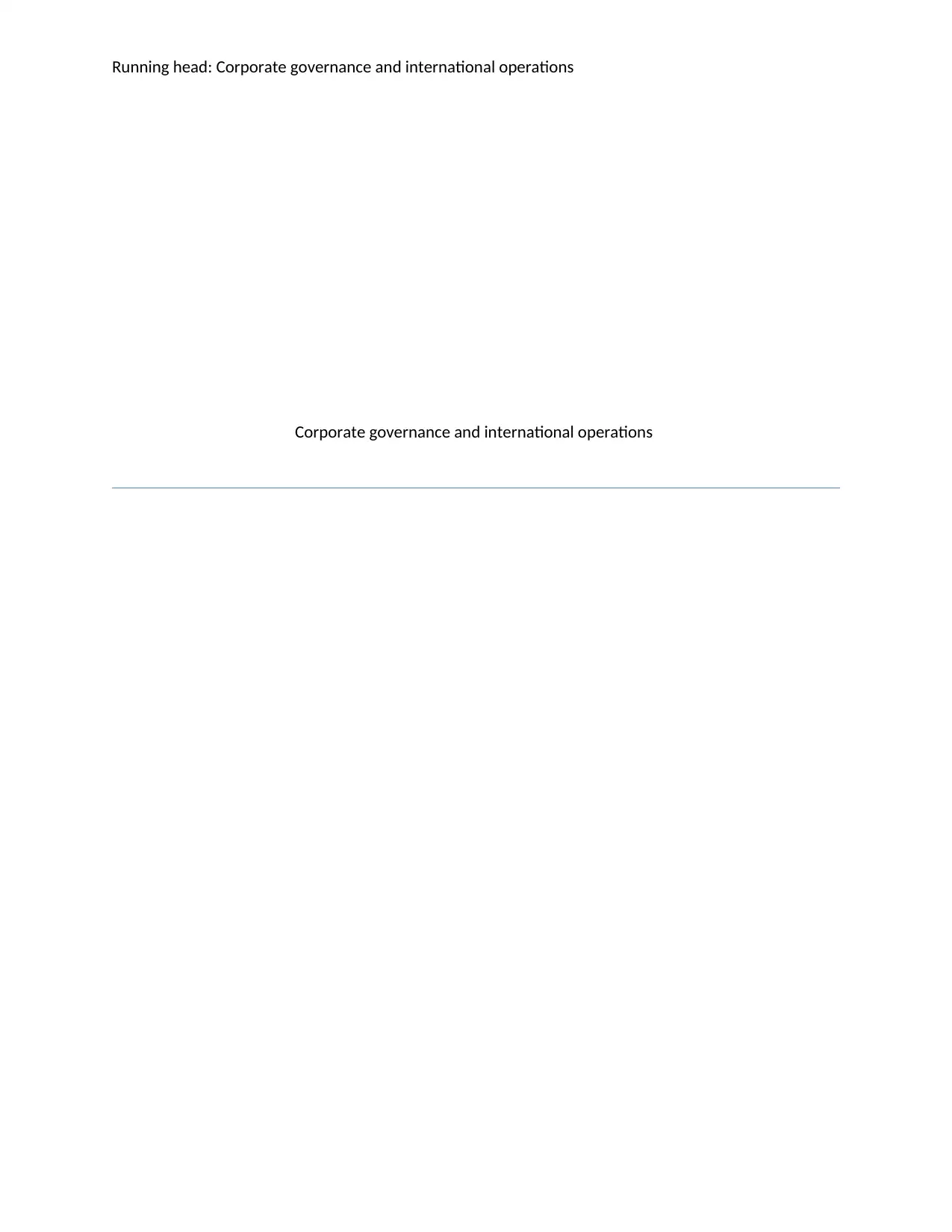
Running head: Corporate governance and international operations
Corporate governance and international operations
Corporate governance and international operations
Paraphrase This Document
Need a fresh take? Get an instant paraphrase of this document with our AI Paraphraser
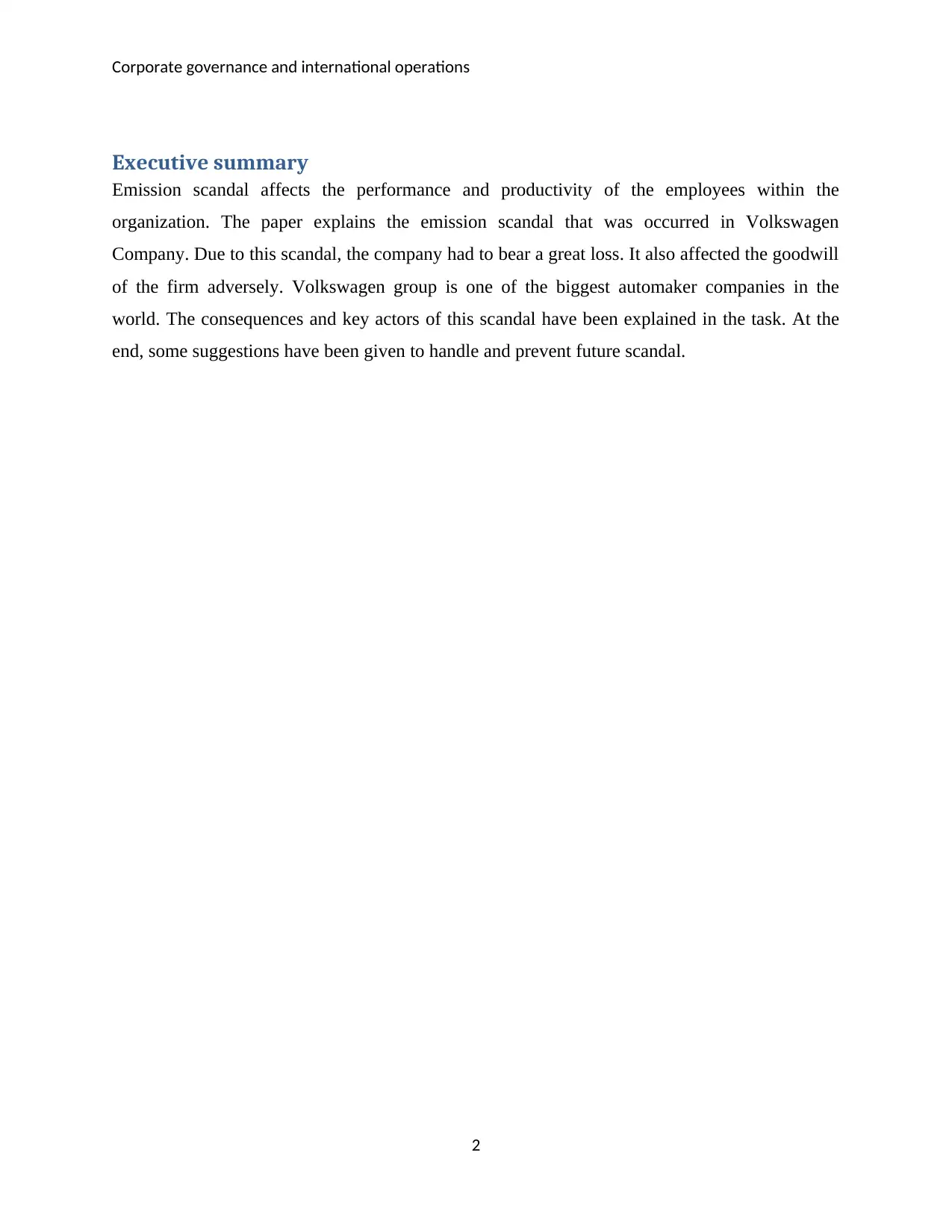
Corporate governance and international operations
Executive summary
Emission scandal affects the performance and productivity of the employees within the
organization. The paper explains the emission scandal that was occurred in Volkswagen
Company. Due to this scandal, the company had to bear a great loss. It also affected the goodwill
of the firm adversely. Volkswagen group is one of the biggest automaker companies in the
world. The consequences and key actors of this scandal have been explained in the task. At the
end, some suggestions have been given to handle and prevent future scandal.
2
Executive summary
Emission scandal affects the performance and productivity of the employees within the
organization. The paper explains the emission scandal that was occurred in Volkswagen
Company. Due to this scandal, the company had to bear a great loss. It also affected the goodwill
of the firm adversely. Volkswagen group is one of the biggest automaker companies in the
world. The consequences and key actors of this scandal have been explained in the task. At the
end, some suggestions have been given to handle and prevent future scandal.
2
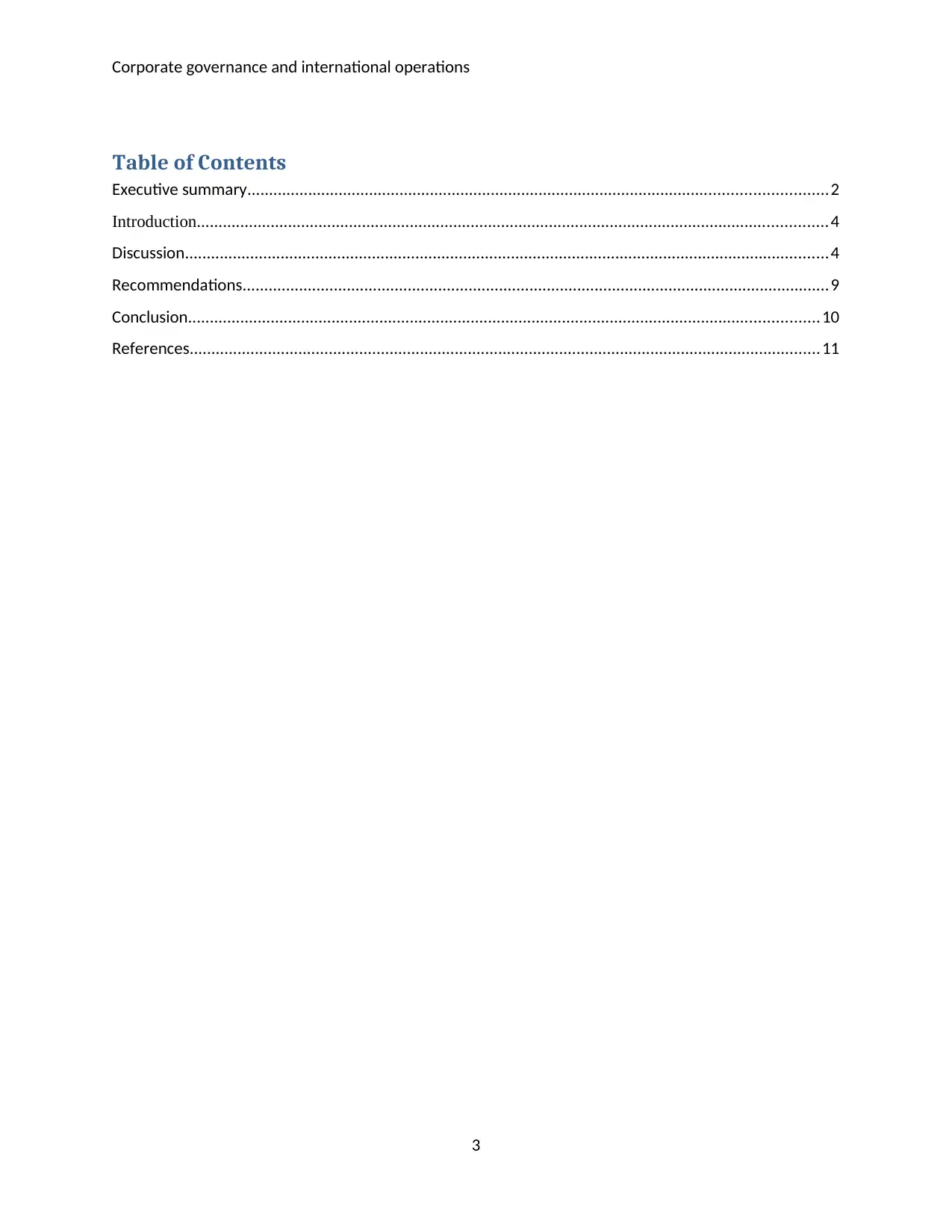
Corporate governance and international operations
Table of Contents
Executive summary.....................................................................................................................................2
Introduction.................................................................................................................................................4
Discussion....................................................................................................................................................4
Recommendations.......................................................................................................................................9
Conclusion.................................................................................................................................................10
References.................................................................................................................................................11
3
Table of Contents
Executive summary.....................................................................................................................................2
Introduction.................................................................................................................................................4
Discussion....................................................................................................................................................4
Recommendations.......................................................................................................................................9
Conclusion.................................................................................................................................................10
References.................................................................................................................................................11
3
⊘ This is a preview!⊘
Do you want full access?
Subscribe today to unlock all pages.

Trusted by 1+ million students worldwide
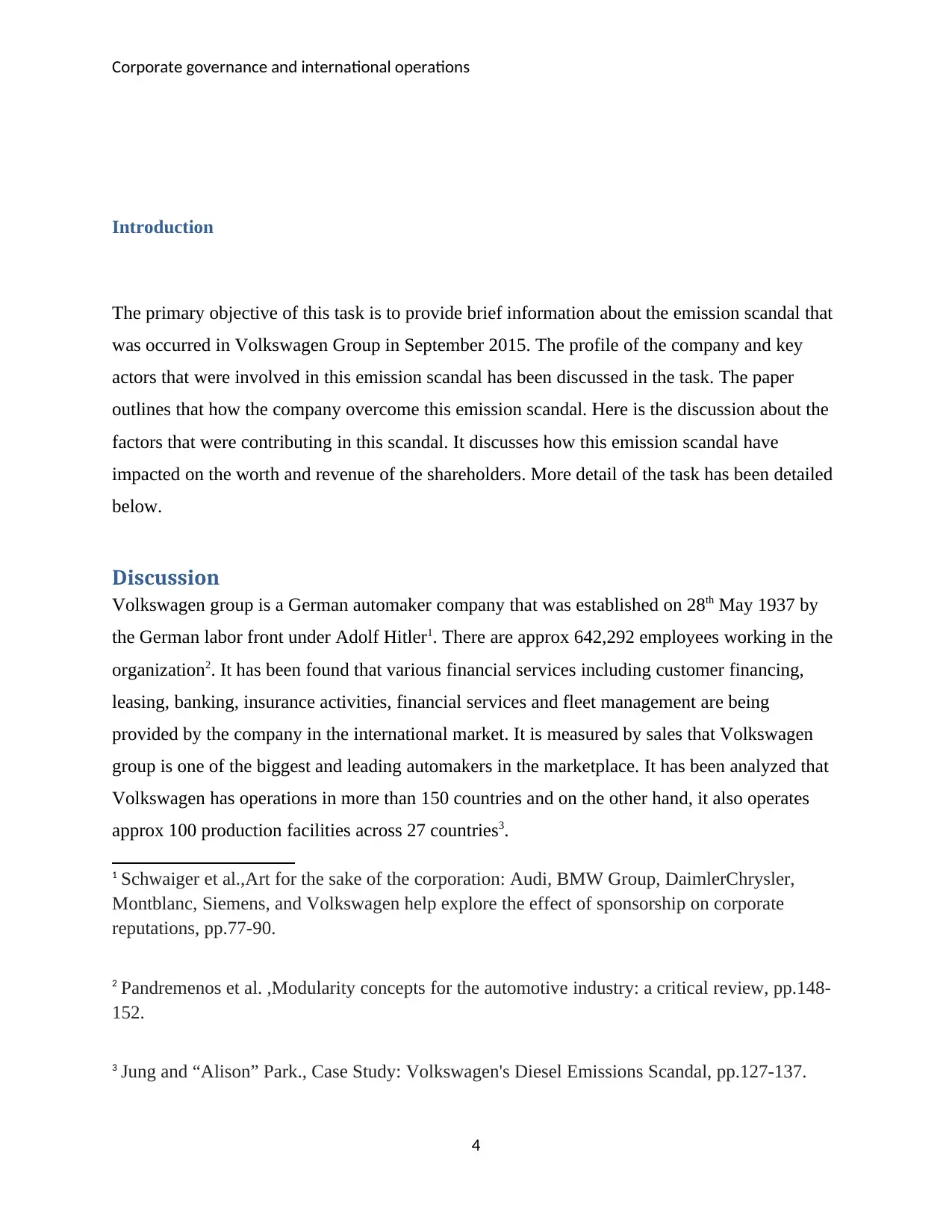
Corporate governance and international operations
Introduction
The primary objective of this task is to provide brief information about the emission scandal that
was occurred in Volkswagen Group in September 2015. The profile of the company and key
actors that were involved in this emission scandal has been discussed in the task. The paper
outlines that how the company overcome this emission scandal. Here is the discussion about the
factors that were contributing in this scandal. It discusses how this emission scandal have
impacted on the worth and revenue of the shareholders. More detail of the task has been detailed
below.
Discussion
Volkswagen group is a German automaker company that was established on 28th May 1937 by
the German labor front under Adolf Hitler1. There are approx 642,292 employees working in the
organization2. It has been found that various financial services including customer financing,
leasing, banking, insurance activities, financial services and fleet management are being
provided by the company in the international market. It is measured by sales that Volkswagen
group is one of the biggest and leading automakers in the marketplace. It has been analyzed that
Volkswagen has operations in more than 150 countries and on the other hand, it also operates
approx 100 production facilities across 27 countries3.
1 Schwaiger et al.,Art for the sake of the corporation: Audi, BMW Group, DaimlerChrysler,
Montblanc, Siemens, and Volkswagen help explore the effect of sponsorship on corporate
reputations, pp.77-90.
2 Pandremenos et al. ,Modularity concepts for the automotive industry: a critical review, pp.148-
152.
3 Jung and “Alison” Park., Case Study: Volkswagen's Diesel Emissions Scandal, pp.127-137.
4
Introduction
The primary objective of this task is to provide brief information about the emission scandal that
was occurred in Volkswagen Group in September 2015. The profile of the company and key
actors that were involved in this emission scandal has been discussed in the task. The paper
outlines that how the company overcome this emission scandal. Here is the discussion about the
factors that were contributing in this scandal. It discusses how this emission scandal have
impacted on the worth and revenue of the shareholders. More detail of the task has been detailed
below.
Discussion
Volkswagen group is a German automaker company that was established on 28th May 1937 by
the German labor front under Adolf Hitler1. There are approx 642,292 employees working in the
organization2. It has been found that various financial services including customer financing,
leasing, banking, insurance activities, financial services and fleet management are being
provided by the company in the international market. It is measured by sales that Volkswagen
group is one of the biggest and leading automakers in the marketplace. It has been analyzed that
Volkswagen has operations in more than 150 countries and on the other hand, it also operates
approx 100 production facilities across 27 countries3.
1 Schwaiger et al.,Art for the sake of the corporation: Audi, BMW Group, DaimlerChrysler,
Montblanc, Siemens, and Volkswagen help explore the effect of sponsorship on corporate
reputations, pp.77-90.
2 Pandremenos et al. ,Modularity concepts for the automotive industry: a critical review, pp.148-
152.
3 Jung and “Alison” Park., Case Study: Volkswagen's Diesel Emissions Scandal, pp.127-137.
4
Paraphrase This Document
Need a fresh take? Get an instant paraphrase of this document with our AI Paraphraser
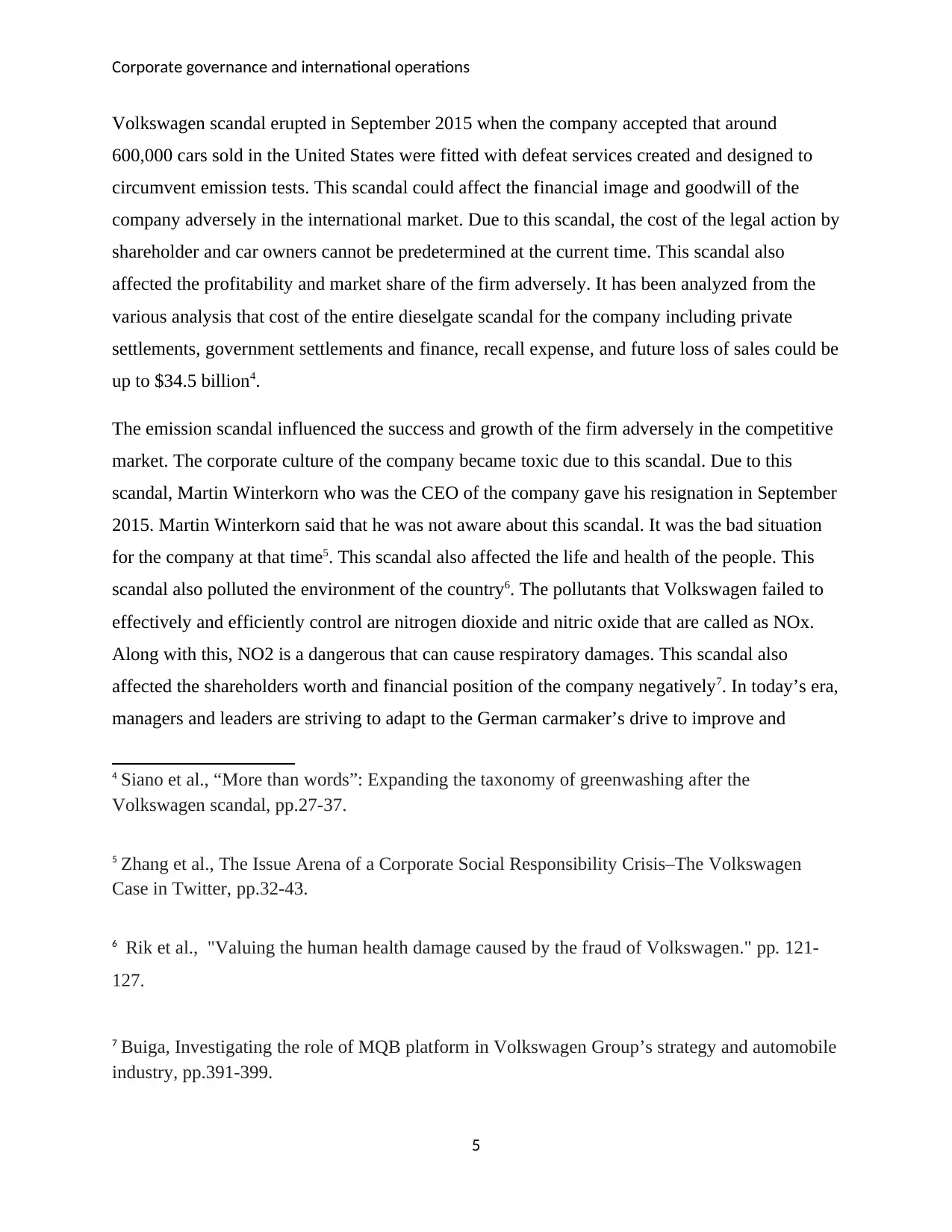
Corporate governance and international operations
Volkswagen scandal erupted in September 2015 when the company accepted that around
600,000 cars sold in the United States were fitted with defeat services created and designed to
circumvent emission tests. This scandal could affect the financial image and goodwill of the
company adversely in the international market. Due to this scandal, the cost of the legal action by
shareholder and car owners cannot be predetermined at the current time. This scandal also
affected the profitability and market share of the firm adversely. It has been analyzed from the
various analysis that cost of the entire dieselgate scandal for the company including private
settlements, government settlements and finance, recall expense, and future loss of sales could be
up to $34.5 billion4.
The emission scandal influenced the success and growth of the firm adversely in the competitive
market. The corporate culture of the company became toxic due to this scandal. Due to this
scandal, Martin Winterkorn who was the CEO of the company gave his resignation in September
2015. Martin Winterkorn said that he was not aware about this scandal. It was the bad situation
for the company at that time5. This scandal also affected the life and health of the people. This
scandal also polluted the environment of the country6. The pollutants that Volkswagen failed to
effectively and efficiently control are nitrogen dioxide and nitric oxide that are called as NOx.
Along with this, NO2 is a dangerous that can cause respiratory damages. This scandal also
affected the shareholders worth and financial position of the company negatively7. In today’s era,
managers and leaders are striving to adapt to the German carmaker’s drive to improve and
4 Siano et al., “More than words”: Expanding the taxonomy of greenwashing after the
Volkswagen scandal, pp.27-37.
5 Zhang et al., The Issue Arena of a Corporate Social Responsibility Crisis–The Volkswagen
Case in Twitter, pp.32-43.
6 Rik et al., "Valuing the human health damage caused by the fraud of Volkswagen." pp. 121-
127.
7 Buiga, Investigating the role of MQB platform in Volkswagen Group’s strategy and automobile
industry, pp.391-399.
5
Volkswagen scandal erupted in September 2015 when the company accepted that around
600,000 cars sold in the United States were fitted with defeat services created and designed to
circumvent emission tests. This scandal could affect the financial image and goodwill of the
company adversely in the international market. Due to this scandal, the cost of the legal action by
shareholder and car owners cannot be predetermined at the current time. This scandal also
affected the profitability and market share of the firm adversely. It has been analyzed from the
various analysis that cost of the entire dieselgate scandal for the company including private
settlements, government settlements and finance, recall expense, and future loss of sales could be
up to $34.5 billion4.
The emission scandal influenced the success and growth of the firm adversely in the competitive
market. The corporate culture of the company became toxic due to this scandal. Due to this
scandal, Martin Winterkorn who was the CEO of the company gave his resignation in September
2015. Martin Winterkorn said that he was not aware about this scandal. It was the bad situation
for the company at that time5. This scandal also affected the life and health of the people. This
scandal also polluted the environment of the country6. The pollutants that Volkswagen failed to
effectively and efficiently control are nitrogen dioxide and nitric oxide that are called as NOx.
Along with this, NO2 is a dangerous that can cause respiratory damages. This scandal also
affected the shareholders worth and financial position of the company negatively7. In today’s era,
managers and leaders are striving to adapt to the German carmaker’s drive to improve and
4 Siano et al., “More than words”: Expanding the taxonomy of greenwashing after the
Volkswagen scandal, pp.27-37.
5 Zhang et al., The Issue Arena of a Corporate Social Responsibility Crisis–The Volkswagen
Case in Twitter, pp.32-43.
6 Rik et al., "Valuing the human health damage caused by the fraud of Volkswagen." pp. 121-
127.
7 Buiga, Investigating the role of MQB platform in Volkswagen Group’s strategy and automobile
industry, pp.391-399.
5
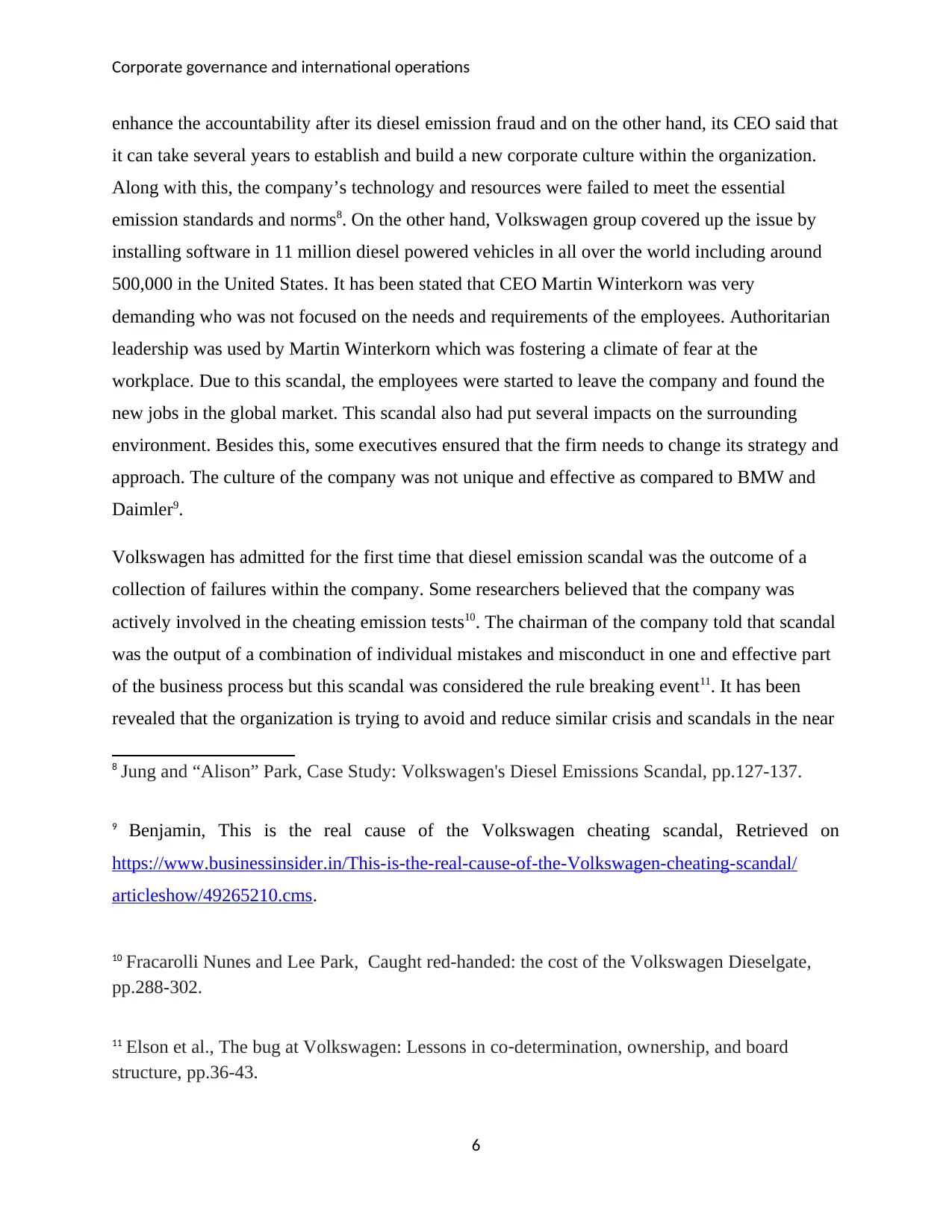
Corporate governance and international operations
enhance the accountability after its diesel emission fraud and on the other hand, its CEO said that
it can take several years to establish and build a new corporate culture within the organization.
Along with this, the company’s technology and resources were failed to meet the essential
emission standards and norms8. On the other hand, Volkswagen group covered up the issue by
installing software in 11 million diesel powered vehicles in all over the world including around
500,000 in the United States. It has been stated that CEO Martin Winterkorn was very
demanding who was not focused on the needs and requirements of the employees. Authoritarian
leadership was used by Martin Winterkorn which was fostering a climate of fear at the
workplace. Due to this scandal, the employees were started to leave the company and found the
new jobs in the global market. This scandal also had put several impacts on the surrounding
environment. Besides this, some executives ensured that the firm needs to change its strategy and
approach. The culture of the company was not unique and effective as compared to BMW and
Daimler9.
Volkswagen has admitted for the first time that diesel emission scandal was the outcome of a
collection of failures within the company. Some researchers believed that the company was
actively involved in the cheating emission tests10. The chairman of the company told that scandal
was the output of a combination of individual mistakes and misconduct in one and effective part
of the business process but this scandal was considered the rule breaking event11. It has been
revealed that the organization is trying to avoid and reduce similar crisis and scandals in the near
8 Jung and “Alison” Park, Case Study: Volkswagen's Diesel Emissions Scandal, pp.127-137.
9 Benjamin, This is the real cause of the Volkswagen cheating scandal, Retrieved on
https://www.businessinsider.in/This-is-the-real-cause-of-the-Volkswagen-cheating-scandal/
articleshow/49265210.cms.
10 Fracarolli Nunes and Lee Park, Caught red-handed: the cost of the Volkswagen Dieselgate,
pp.288-302.
11 Elson et al., The bug at Volkswagen: Lessons in co‐determination, ownership, and board
structure, pp.36-43.
6
enhance the accountability after its diesel emission fraud and on the other hand, its CEO said that
it can take several years to establish and build a new corporate culture within the organization.
Along with this, the company’s technology and resources were failed to meet the essential
emission standards and norms8. On the other hand, Volkswagen group covered up the issue by
installing software in 11 million diesel powered vehicles in all over the world including around
500,000 in the United States. It has been stated that CEO Martin Winterkorn was very
demanding who was not focused on the needs and requirements of the employees. Authoritarian
leadership was used by Martin Winterkorn which was fostering a climate of fear at the
workplace. Due to this scandal, the employees were started to leave the company and found the
new jobs in the global market. This scandal also had put several impacts on the surrounding
environment. Besides this, some executives ensured that the firm needs to change its strategy and
approach. The culture of the company was not unique and effective as compared to BMW and
Daimler9.
Volkswagen has admitted for the first time that diesel emission scandal was the outcome of a
collection of failures within the company. Some researchers believed that the company was
actively involved in the cheating emission tests10. The chairman of the company told that scandal
was the output of a combination of individual mistakes and misconduct in one and effective part
of the business process but this scandal was considered the rule breaking event11. It has been
revealed that the organization is trying to avoid and reduce similar crisis and scandals in the near
8 Jung and “Alison” Park, Case Study: Volkswagen's Diesel Emissions Scandal, pp.127-137.
9 Benjamin, This is the real cause of the Volkswagen cheating scandal, Retrieved on
https://www.businessinsider.in/This-is-the-real-cause-of-the-Volkswagen-cheating-scandal/
articleshow/49265210.cms.
10 Fracarolli Nunes and Lee Park, Caught red-handed: the cost of the Volkswagen Dieselgate,
pp.288-302.
11 Elson et al., The bug at Volkswagen: Lessons in co‐determination, ownership, and board
structure, pp.36-43.
6
⊘ This is a preview!⊘
Do you want full access?
Subscribe today to unlock all pages.

Trusted by 1+ million students worldwide
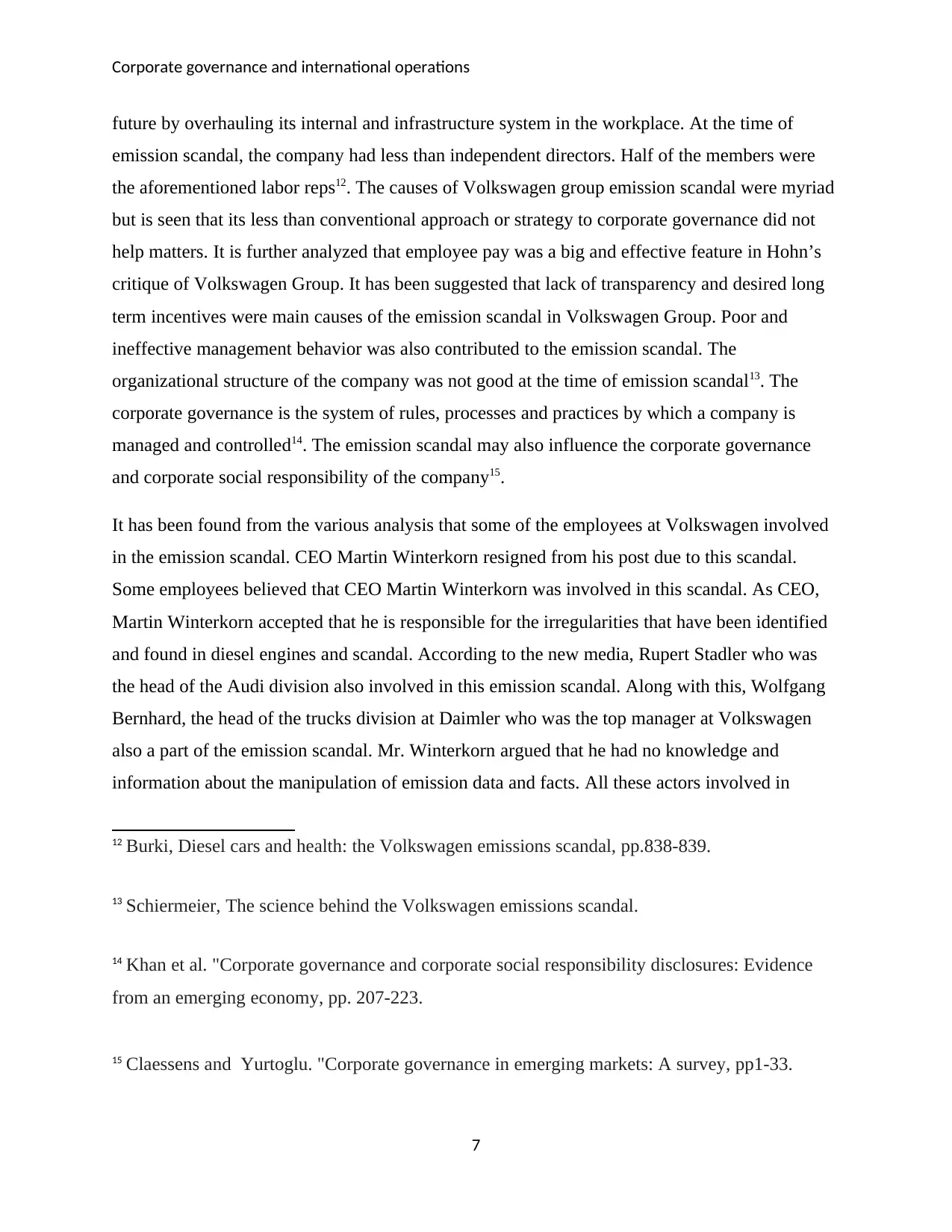
Corporate governance and international operations
future by overhauling its internal and infrastructure system in the workplace. At the time of
emission scandal, the company had less than independent directors. Half of the members were
the aforementioned labor reps12. The causes of Volkswagen group emission scandal were myriad
but is seen that its less than conventional approach or strategy to corporate governance did not
help matters. It is further analyzed that employee pay was a big and effective feature in Hohn’s
critique of Volkswagen Group. It has been suggested that lack of transparency and desired long
term incentives were main causes of the emission scandal in Volkswagen Group. Poor and
ineffective management behavior was also contributed to the emission scandal. The
organizational structure of the company was not good at the time of emission scandal13. The
corporate governance is the system of rules, processes and practices by which a company is
managed and controlled14. The emission scandal may also influence the corporate governance
and corporate social responsibility of the company15.
It has been found from the various analysis that some of the employees at Volkswagen involved
in the emission scandal. CEO Martin Winterkorn resigned from his post due to this scandal.
Some employees believed that CEO Martin Winterkorn was involved in this scandal. As CEO,
Martin Winterkorn accepted that he is responsible for the irregularities that have been identified
and found in diesel engines and scandal. According to the new media, Rupert Stadler who was
the head of the Audi division also involved in this emission scandal. Along with this, Wolfgang
Bernhard, the head of the trucks division at Daimler who was the top manager at Volkswagen
also a part of the emission scandal. Mr. Winterkorn argued that he had no knowledge and
information about the manipulation of emission data and facts. All these actors involved in
12 Burki, Diesel cars and health: the Volkswagen emissions scandal, pp.838-839.
13 Schiermeier, The science behind the Volkswagen emissions scandal.
14 Khan et al. "Corporate governance and corporate social responsibility disclosures: Evidence
from an emerging economy, pp. 207-223.
15 Claessens and Yurtoglu. "Corporate governance in emerging markets: A survey, pp1-33.
7
future by overhauling its internal and infrastructure system in the workplace. At the time of
emission scandal, the company had less than independent directors. Half of the members were
the aforementioned labor reps12. The causes of Volkswagen group emission scandal were myriad
but is seen that its less than conventional approach or strategy to corporate governance did not
help matters. It is further analyzed that employee pay was a big and effective feature in Hohn’s
critique of Volkswagen Group. It has been suggested that lack of transparency and desired long
term incentives were main causes of the emission scandal in Volkswagen Group. Poor and
ineffective management behavior was also contributed to the emission scandal. The
organizational structure of the company was not good at the time of emission scandal13. The
corporate governance is the system of rules, processes and practices by which a company is
managed and controlled14. The emission scandal may also influence the corporate governance
and corporate social responsibility of the company15.
It has been found from the various analysis that some of the employees at Volkswagen involved
in the emission scandal. CEO Martin Winterkorn resigned from his post due to this scandal.
Some employees believed that CEO Martin Winterkorn was involved in this scandal. As CEO,
Martin Winterkorn accepted that he is responsible for the irregularities that have been identified
and found in diesel engines and scandal. According to the new media, Rupert Stadler who was
the head of the Audi division also involved in this emission scandal. Along with this, Wolfgang
Bernhard, the head of the trucks division at Daimler who was the top manager at Volkswagen
also a part of the emission scandal. Mr. Winterkorn argued that he had no knowledge and
information about the manipulation of emission data and facts. All these actors involved in
12 Burki, Diesel cars and health: the Volkswagen emissions scandal, pp.838-839.
13 Schiermeier, The science behind the Volkswagen emissions scandal.
14 Khan et al. "Corporate governance and corporate social responsibility disclosures: Evidence
from an emerging economy, pp. 207-223.
15 Claessens and Yurtoglu. "Corporate governance in emerging markets: A survey, pp1-33.
7
Paraphrase This Document
Need a fresh take? Get an instant paraphrase of this document with our AI Paraphraser
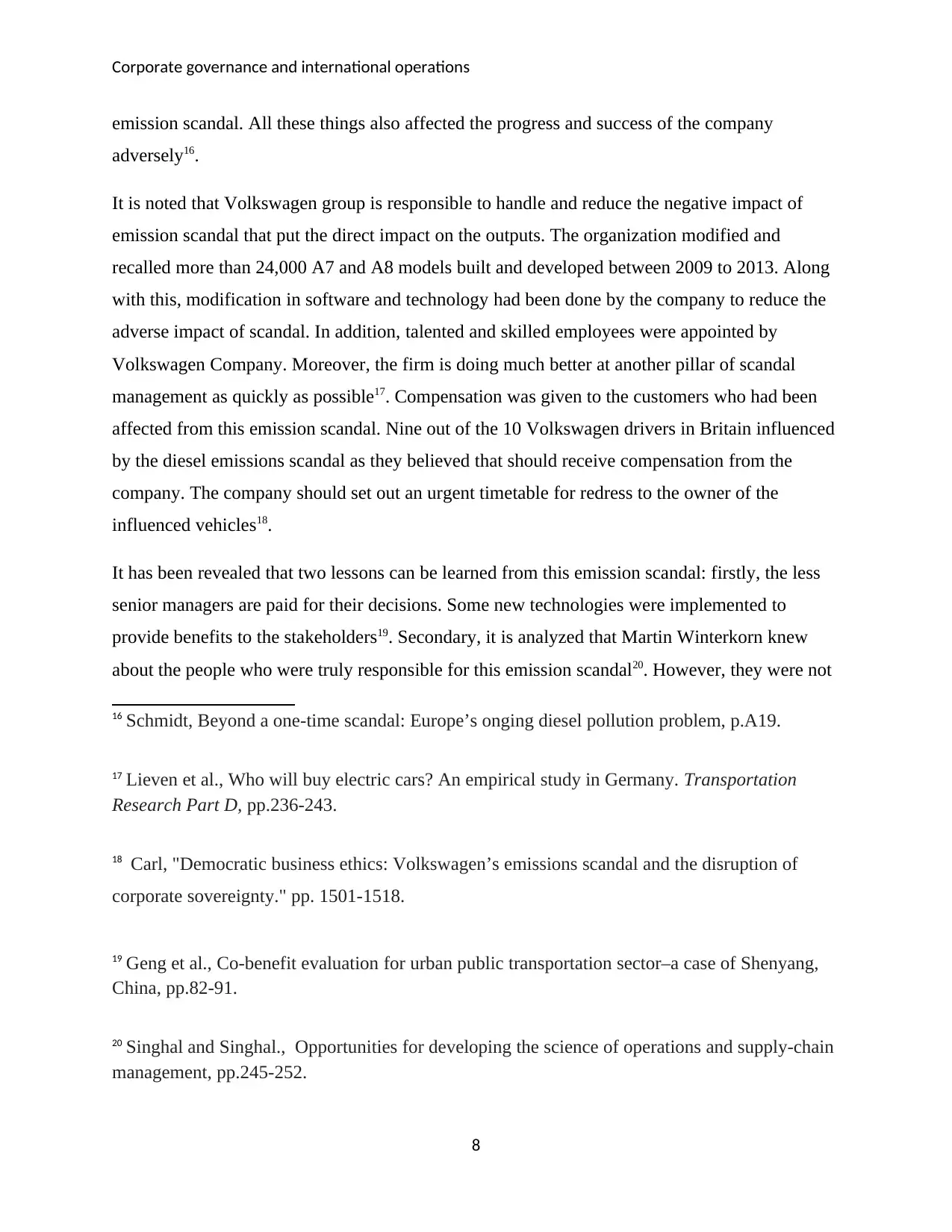
Corporate governance and international operations
emission scandal. All these things also affected the progress and success of the company
adversely16.
It is noted that Volkswagen group is responsible to handle and reduce the negative impact of
emission scandal that put the direct impact on the outputs. The organization modified and
recalled more than 24,000 A7 and A8 models built and developed between 2009 to 2013. Along
with this, modification in software and technology had been done by the company to reduce the
adverse impact of scandal. In addition, talented and skilled employees were appointed by
Volkswagen Company. Moreover, the firm is doing much better at another pillar of scandal
management as quickly as possible17. Compensation was given to the customers who had been
affected from this emission scandal. Nine out of the 10 Volkswagen drivers in Britain influenced
by the diesel emissions scandal as they believed that should receive compensation from the
company. The company should set out an urgent timetable for redress to the owner of the
influenced vehicles18.
It has been revealed that two lessons can be learned from this emission scandal: firstly, the less
senior managers are paid for their decisions. Some new technologies were implemented to
provide benefits to the stakeholders19. Secondary, it is analyzed that Martin Winterkorn knew
about the people who were truly responsible for this emission scandal20. However, they were not
16 Schmidt, Beyond a one-time scandal: Europe’s onging diesel pollution problem, p.A19.
17 Lieven et al., Who will buy electric cars? An empirical study in Germany. Transportation
Research Part D, pp.236-243.
18 Carl, "Democratic business ethics: Volkswagen’s emissions scandal and the disruption of
corporate sovereignty." pp. 1501-1518.
19 Geng et al., Co-benefit evaluation for urban public transportation sector–a case of Shenyang,
China, pp.82-91.
20 Singhal and Singhal., Opportunities for developing the science of operations and supply-chain
management, pp.245-252.
8
emission scandal. All these things also affected the progress and success of the company
adversely16.
It is noted that Volkswagen group is responsible to handle and reduce the negative impact of
emission scandal that put the direct impact on the outputs. The organization modified and
recalled more than 24,000 A7 and A8 models built and developed between 2009 to 2013. Along
with this, modification in software and technology had been done by the company to reduce the
adverse impact of scandal. In addition, talented and skilled employees were appointed by
Volkswagen Company. Moreover, the firm is doing much better at another pillar of scandal
management as quickly as possible17. Compensation was given to the customers who had been
affected from this emission scandal. Nine out of the 10 Volkswagen drivers in Britain influenced
by the diesel emissions scandal as they believed that should receive compensation from the
company. The company should set out an urgent timetable for redress to the owner of the
influenced vehicles18.
It has been revealed that two lessons can be learned from this emission scandal: firstly, the less
senior managers are paid for their decisions. Some new technologies were implemented to
provide benefits to the stakeholders19. Secondary, it is analyzed that Martin Winterkorn knew
about the people who were truly responsible for this emission scandal20. However, they were not
16 Schmidt, Beyond a one-time scandal: Europe’s onging diesel pollution problem, p.A19.
17 Lieven et al., Who will buy electric cars? An empirical study in Germany. Transportation
Research Part D, pp.236-243.
18 Carl, "Democratic business ethics: Volkswagen’s emissions scandal and the disruption of
corporate sovereignty." pp. 1501-1518.
19 Geng et al., Co-benefit evaluation for urban public transportation sector–a case of Shenyang,
China, pp.82-91.
20 Singhal and Singhal., Opportunities for developing the science of operations and supply-chain
management, pp.245-252.
8
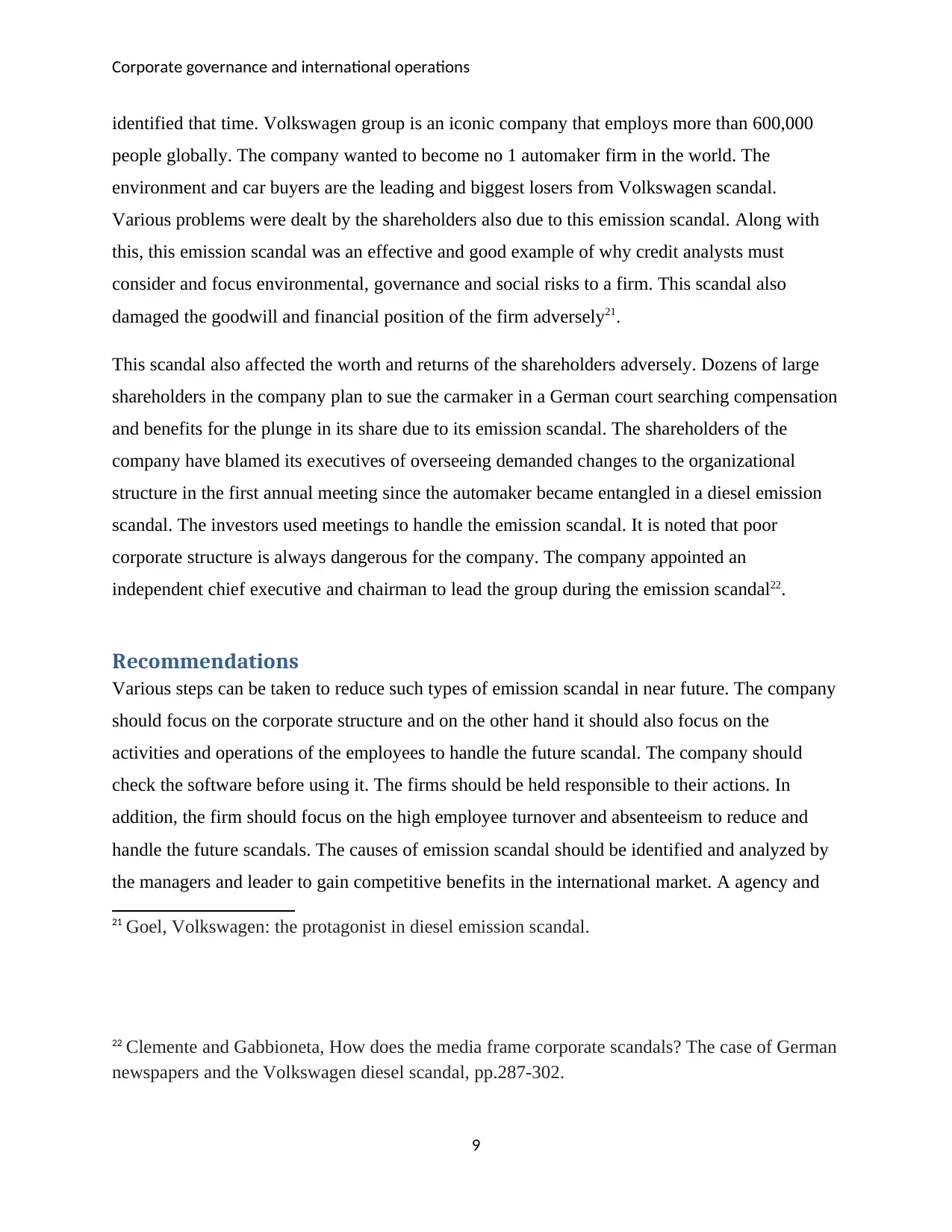
Corporate governance and international operations
identified that time. Volkswagen group is an iconic company that employs more than 600,000
people globally. The company wanted to become no 1 automaker firm in the world. The
environment and car buyers are the leading and biggest losers from Volkswagen scandal.
Various problems were dealt by the shareholders also due to this emission scandal. Along with
this, this emission scandal was an effective and good example of why credit analysts must
consider and focus environmental, governance and social risks to a firm. This scandal also
damaged the goodwill and financial position of the firm adversely21.
This scandal also affected the worth and returns of the shareholders adversely. Dozens of large
shareholders in the company plan to sue the carmaker in a German court searching compensation
and benefits for the plunge in its share due to its emission scandal. The shareholders of the
company have blamed its executives of overseeing demanded changes to the organizational
structure in the first annual meeting since the automaker became entangled in a diesel emission
scandal. The investors used meetings to handle the emission scandal. It is noted that poor
corporate structure is always dangerous for the company. The company appointed an
independent chief executive and chairman to lead the group during the emission scandal22.
Recommendations
Various steps can be taken to reduce such types of emission scandal in near future. The company
should focus on the corporate structure and on the other hand it should also focus on the
activities and operations of the employees to handle the future scandal. The company should
check the software before using it. The firms should be held responsible to their actions. In
addition, the firm should focus on the high employee turnover and absenteeism to reduce and
handle the future scandals. The causes of emission scandal should be identified and analyzed by
the managers and leader to gain competitive benefits in the international market. A agency and
21 Goel, Volkswagen: the protagonist in diesel emission scandal.
22 Clemente and Gabbioneta, How does the media frame corporate scandals? The case of German
newspapers and the Volkswagen diesel scandal, pp.287-302.
9
identified that time. Volkswagen group is an iconic company that employs more than 600,000
people globally. The company wanted to become no 1 automaker firm in the world. The
environment and car buyers are the leading and biggest losers from Volkswagen scandal.
Various problems were dealt by the shareholders also due to this emission scandal. Along with
this, this emission scandal was an effective and good example of why credit analysts must
consider and focus environmental, governance and social risks to a firm. This scandal also
damaged the goodwill and financial position of the firm adversely21.
This scandal also affected the worth and returns of the shareholders adversely. Dozens of large
shareholders in the company plan to sue the carmaker in a German court searching compensation
and benefits for the plunge in its share due to its emission scandal. The shareholders of the
company have blamed its executives of overseeing demanded changes to the organizational
structure in the first annual meeting since the automaker became entangled in a diesel emission
scandal. The investors used meetings to handle the emission scandal. It is noted that poor
corporate structure is always dangerous for the company. The company appointed an
independent chief executive and chairman to lead the group during the emission scandal22.
Recommendations
Various steps can be taken to reduce such types of emission scandal in near future. The company
should focus on the corporate structure and on the other hand it should also focus on the
activities and operations of the employees to handle the future scandal. The company should
check the software before using it. The firms should be held responsible to their actions. In
addition, the firm should focus on the high employee turnover and absenteeism to reduce and
handle the future scandals. The causes of emission scandal should be identified and analyzed by
the managers and leader to gain competitive benefits in the international market. A agency and
21 Goel, Volkswagen: the protagonist in diesel emission scandal.
22 Clemente and Gabbioneta, How does the media frame corporate scandals? The case of German
newspapers and the Volkswagen diesel scandal, pp.287-302.
9
⊘ This is a preview!⊘
Do you want full access?
Subscribe today to unlock all pages.

Trusted by 1+ million students worldwide
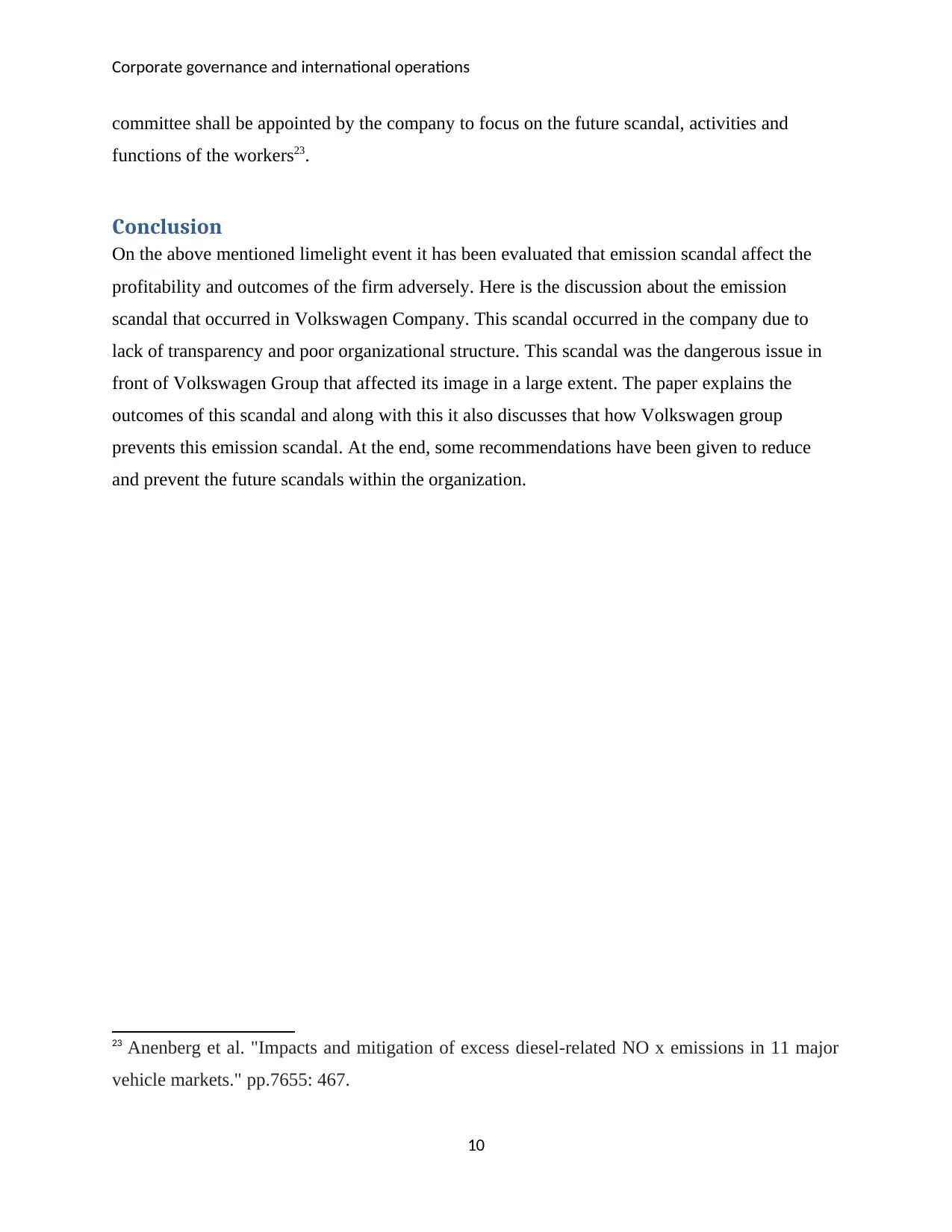
Corporate governance and international operations
committee shall be appointed by the company to focus on the future scandal, activities and
functions of the workers23.
Conclusion
On the above mentioned limelight event it has been evaluated that emission scandal affect the
profitability and outcomes of the firm adversely. Here is the discussion about the emission
scandal that occurred in Volkswagen Company. This scandal occurred in the company due to
lack of transparency and poor organizational structure. This scandal was the dangerous issue in
front of Volkswagen Group that affected its image in a large extent. The paper explains the
outcomes of this scandal and along with this it also discusses that how Volkswagen group
prevents this emission scandal. At the end, some recommendations have been given to reduce
and prevent the future scandals within the organization.
23 Anenberg et al. "Impacts and mitigation of excess diesel-related NO x emissions in 11 major
vehicle markets." pp.7655: 467.
10
committee shall be appointed by the company to focus on the future scandal, activities and
functions of the workers23.
Conclusion
On the above mentioned limelight event it has been evaluated that emission scandal affect the
profitability and outcomes of the firm adversely. Here is the discussion about the emission
scandal that occurred in Volkswagen Company. This scandal occurred in the company due to
lack of transparency and poor organizational structure. This scandal was the dangerous issue in
front of Volkswagen Group that affected its image in a large extent. The paper explains the
outcomes of this scandal and along with this it also discusses that how Volkswagen group
prevents this emission scandal. At the end, some recommendations have been given to reduce
and prevent the future scandals within the organization.
23 Anenberg et al. "Impacts and mitigation of excess diesel-related NO x emissions in 11 major
vehicle markets." pp.7655: 467.
10
Paraphrase This Document
Need a fresh take? Get an instant paraphrase of this document with our AI Paraphraser
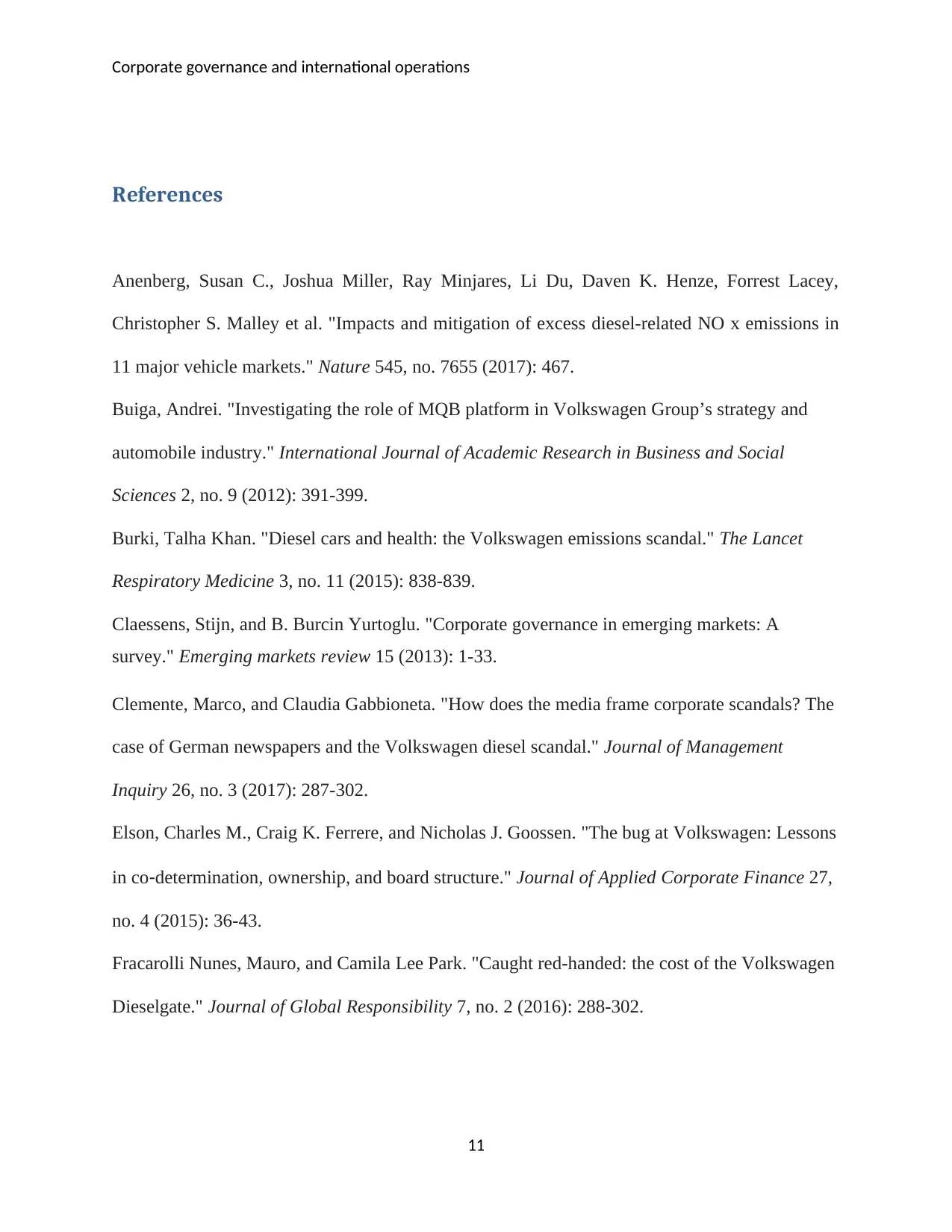
Corporate governance and international operations
References
Anenberg, Susan C., Joshua Miller, Ray Minjares, Li Du, Daven K. Henze, Forrest Lacey,
Christopher S. Malley et al. "Impacts and mitigation of excess diesel-related NO x emissions in
11 major vehicle markets." Nature 545, no. 7655 (2017): 467.
Buiga, Andrei. "Investigating the role of MQB platform in Volkswagen Group’s strategy and
automobile industry." International Journal of Academic Research in Business and Social
Sciences 2, no. 9 (2012): 391-399.
Burki, Talha Khan. "Diesel cars and health: the Volkswagen emissions scandal." The Lancet
Respiratory Medicine 3, no. 11 (2015): 838-839.
Claessens, Stijn, and B. Burcin Yurtoglu. "Corporate governance in emerging markets: A
survey." Emerging markets review 15 (2013): 1-33.
Clemente, Marco, and Claudia Gabbioneta. "How does the media frame corporate scandals? The
case of German newspapers and the Volkswagen diesel scandal." Journal of Management
Inquiry 26, no. 3 (2017): 287-302.
Elson, Charles M., Craig K. Ferrere, and Nicholas J. Goossen. "The bug at Volkswagen: Lessons
in co‐determination, ownership, and board structure." Journal of Applied Corporate Finance 27,
no. 4 (2015): 36-43.
Fracarolli Nunes, Mauro, and Camila Lee Park. "Caught red-handed: the cost of the Volkswagen
Dieselgate." Journal of Global Responsibility 7, no. 2 (2016): 288-302.
11
References
Anenberg, Susan C., Joshua Miller, Ray Minjares, Li Du, Daven K. Henze, Forrest Lacey,
Christopher S. Malley et al. "Impacts and mitigation of excess diesel-related NO x emissions in
11 major vehicle markets." Nature 545, no. 7655 (2017): 467.
Buiga, Andrei. "Investigating the role of MQB platform in Volkswagen Group’s strategy and
automobile industry." International Journal of Academic Research in Business and Social
Sciences 2, no. 9 (2012): 391-399.
Burki, Talha Khan. "Diesel cars and health: the Volkswagen emissions scandal." The Lancet
Respiratory Medicine 3, no. 11 (2015): 838-839.
Claessens, Stijn, and B. Burcin Yurtoglu. "Corporate governance in emerging markets: A
survey." Emerging markets review 15 (2013): 1-33.
Clemente, Marco, and Claudia Gabbioneta. "How does the media frame corporate scandals? The
case of German newspapers and the Volkswagen diesel scandal." Journal of Management
Inquiry 26, no. 3 (2017): 287-302.
Elson, Charles M., Craig K. Ferrere, and Nicholas J. Goossen. "The bug at Volkswagen: Lessons
in co‐determination, ownership, and board structure." Journal of Applied Corporate Finance 27,
no. 4 (2015): 36-43.
Fracarolli Nunes, Mauro, and Camila Lee Park. "Caught red-handed: the cost of the Volkswagen
Dieselgate." Journal of Global Responsibility 7, no. 2 (2016): 288-302.
11
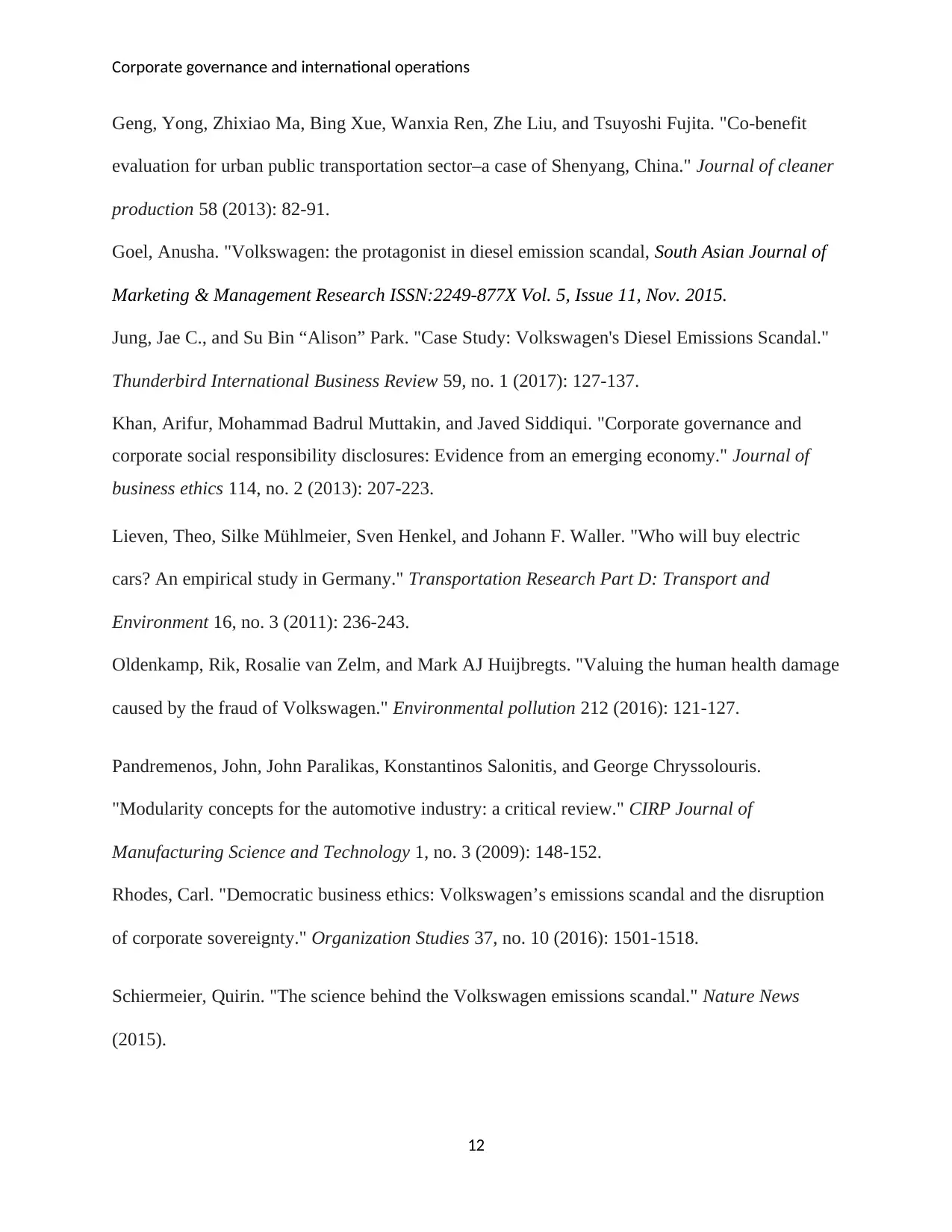
Corporate governance and international operations
Geng, Yong, Zhixiao Ma, Bing Xue, Wanxia Ren, Zhe Liu, and Tsuyoshi Fujita. "Co-benefit
evaluation for urban public transportation sector–a case of Shenyang, China." Journal of cleaner
production 58 (2013): 82-91.
Goel, Anusha. "Volkswagen: the protagonist in diesel emission scandal, South Asian Journal of
Marketing & Management Research ISSN:2249-877X Vol. 5, Issue 11, Nov. 2015.
Jung, Jae C., and Su Bin “Alison” Park. "Case Study: Volkswagen's Diesel Emissions Scandal."
Thunderbird International Business Review 59, no. 1 (2017): 127-137.
Khan, Arifur, Mohammad Badrul Muttakin, and Javed Siddiqui. "Corporate governance and
corporate social responsibility disclosures: Evidence from an emerging economy." Journal of
business ethics 114, no. 2 (2013): 207-223.
Lieven, Theo, Silke Mühlmeier, Sven Henkel, and Johann F. Waller. "Who will buy electric
cars? An empirical study in Germany." Transportation Research Part D: Transport and
Environment 16, no. 3 (2011): 236-243.
Oldenkamp, Rik, Rosalie van Zelm, and Mark AJ Huijbregts. "Valuing the human health damage
caused by the fraud of Volkswagen." Environmental pollution 212 (2016): 121-127.
Pandremenos, John, John Paralikas, Konstantinos Salonitis, and George Chryssolouris.
"Modularity concepts for the automotive industry: a critical review." CIRP Journal of
Manufacturing Science and Technology 1, no. 3 (2009): 148-152.
Rhodes, Carl. "Democratic business ethics: Volkswagen’s emissions scandal and the disruption
of corporate sovereignty." Organization Studies 37, no. 10 (2016): 1501-1518.
Schiermeier, Quirin. "The science behind the Volkswagen emissions scandal." Nature News
(2015).
12
Geng, Yong, Zhixiao Ma, Bing Xue, Wanxia Ren, Zhe Liu, and Tsuyoshi Fujita. "Co-benefit
evaluation for urban public transportation sector–a case of Shenyang, China." Journal of cleaner
production 58 (2013): 82-91.
Goel, Anusha. "Volkswagen: the protagonist in diesel emission scandal, South Asian Journal of
Marketing & Management Research ISSN:2249-877X Vol. 5, Issue 11, Nov. 2015.
Jung, Jae C., and Su Bin “Alison” Park. "Case Study: Volkswagen's Diesel Emissions Scandal."
Thunderbird International Business Review 59, no. 1 (2017): 127-137.
Khan, Arifur, Mohammad Badrul Muttakin, and Javed Siddiqui. "Corporate governance and
corporate social responsibility disclosures: Evidence from an emerging economy." Journal of
business ethics 114, no. 2 (2013): 207-223.
Lieven, Theo, Silke Mühlmeier, Sven Henkel, and Johann F. Waller. "Who will buy electric
cars? An empirical study in Germany." Transportation Research Part D: Transport and
Environment 16, no. 3 (2011): 236-243.
Oldenkamp, Rik, Rosalie van Zelm, and Mark AJ Huijbregts. "Valuing the human health damage
caused by the fraud of Volkswagen." Environmental pollution 212 (2016): 121-127.
Pandremenos, John, John Paralikas, Konstantinos Salonitis, and George Chryssolouris.
"Modularity concepts for the automotive industry: a critical review." CIRP Journal of
Manufacturing Science and Technology 1, no. 3 (2009): 148-152.
Rhodes, Carl. "Democratic business ethics: Volkswagen’s emissions scandal and the disruption
of corporate sovereignty." Organization Studies 37, no. 10 (2016): 1501-1518.
Schiermeier, Quirin. "The science behind the Volkswagen emissions scandal." Nature News
(2015).
12
⊘ This is a preview!⊘
Do you want full access?
Subscribe today to unlock all pages.

Trusted by 1+ million students worldwide
1 out of 13
Related Documents
Your All-in-One AI-Powered Toolkit for Academic Success.
+13062052269
info@desklib.com
Available 24*7 on WhatsApp / Email
![[object Object]](/_next/static/media/star-bottom.7253800d.svg)
Unlock your academic potential
Copyright © 2020–2025 A2Z Services. All Rights Reserved. Developed and managed by ZUCOL.





